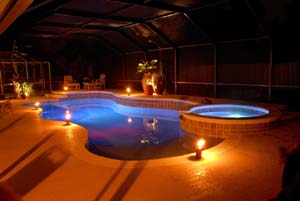Spring is in the air, and now would be a great time to think about ways to contribute to the environment. One way to do so, if you have an outdoor swimming pool, is to consider a solar pool heating system. Not only will it save you money, it will reduce greenhouse gas emissions.
The system is fairly simple to create. The pool provides the thermal storage, so there is no need to purchase anything for this particular aspect. And, the pump that is currently used to filter the water in the pool will also circulate the water through the solar collectors.
Pool Cover
A pool cover will drastically save on heating costs and cost, on average, around $120. Not only that, but this will also reduce the greenhouse gas emissions that are harmful to our environment. David Boehmer states, “…all other pool heating methods…should only be used in conjunction with a pool cover. Not to do so would be like running your house air conditioner during August with the doors and windows open. The system will still work, but the operating cost will be as much as three times higher.” Visit the United States Department of Energy’s Energy Efficiency and Renewable Energy website to peruse estimates of how much it costs to heat a pool with and without a pool cover.
One of the reasons swimming pool covers are so effective is due to the loss of water incurred through evaporation. A pool cover alone can provide up to 50%-70% savings. There are various types of pool covers that you can consider in your purchasing decision. Bubble (or solar) covers are probably the least costly. Vinyl covers, however, are made of a thicker material and tend to have a longer life expectancy than bubble covers.
As stated, pool covers provide savings in your energy costs. However, they also have the following benefits:
* They conserve water by reducing the amount of make-up water needed by 30%-50%
* They reduce the pool’s chemical consumption by 35%-60%
* They reduce cleaning time by keeping dirt and other debris out of the pool
Solar Swimming Pool Heaters
A solar pool heater can significantly reduce the costs you acquire through heating your pool. Not only are they similar in price with other heating options, but they also have extremely low annual operating costs. When compared in many climates, they actually come out on top as being the most cost effective. These types of swimming pool heaters generally last longer than their gas and heat pump counterparts. With proper maintenance, they can last anywhere from ten to twenty years. Here is what is usually included in solar swimming pool heaters:
* A solar collector – the device through which pool water is circulated to be heated by the sun
* A filter – removes debris before water is pumped through the collector
* A pump – circulates water through the filter and collector and back to the pool
* A flow control valve – automatic or manual device that diverts pool water through the solar collector
The material that solar pool collectors are made of varies, and the specific type you will need is dependent on what climate you live in.
 Options for heating the pool include solar energy, fossil fuels (LP gas, natural gas or oil), and heat pump. Each option has its own advantages and disadvantages. Solar pool heating is the most cost-effective use of solar energy in Florida.
Options for heating the pool include solar energy, fossil fuels (LP gas, natural gas or oil), and heat pump. Each option has its own advantages and disadvantages. Solar pool heating is the most cost-effective use of solar energy in Florida.









